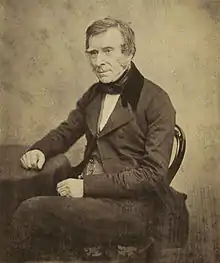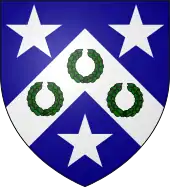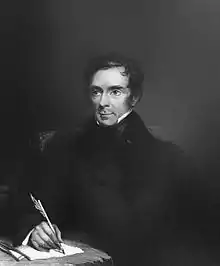Sir Benjamin Collins Brodie, 1st Baronet
Sir Benjamin Collins Brodie, 1st Baronet, PRS (9 June 1783 – 21 October 1862) was an English physiologist and surgeon who pioneered research into bone and joint disease.
Benjamin Collins Brodie | |
|---|---|
 Sir Benjamin Collins Brodie, 1st Baronet | |
| Born | 9 June 1783 Winterslow, Wiltshire, England |
| Died | 21 October 1862 (aged 79) Surrey, England |
| Nationality | England |
| Scientific career | |
| Fields | Physiology |
Biography

Brodie was born in Winterslow, Wiltshire. He received his early education from his father, the Rev Peter Bellinger Brodie;[1] then choosing medicine as his profession he went to London in 1801 and attended the lectures of John Abernethy and attended Charterhouse School. Two years later he became a pupil of Sir Everard Home at St George's Hospital, and in 1808 was appointed assistant surgeon at that institution, on the staff of which he served for over thirty years. In 1810 he was elected a fellow of the Royal Society, to which in the next four or five years he contributed several papers describing original investigations in physiology.[2] In 1834, he was elected a foreign member of the Royal Swedish Academy of Sciences.
At this period he also rapidly obtained a large and lucrative practice and from time to time wrote on surgical questions, contributing numerous papers to the Medical and Chirurgical Society and to the medical journals. His most important work is widely acknowledged to be the 1818 treatise Pathological and Surgical Observations on the Diseases of the Joints, in which he attempts to trace the beginnings of disease in the different tissues that form a joint and to give an exact value to the symptom of pain as evidence of organic disease. This volume led to the adoption by surgeons of more conservative measures in the treatment of diseases of the joints, with consequent reduction in the number of amputations and the saving of many limbs and lives. He also wrote on diseases of the urinary organs and on local nervous affections of a surgical character.[2]
In 1854 he published anonymously a volume of Psychological Inquiries—eight years later, the expanded, revised and updated 1862 volume appeared under his name. He received many honours during his career and attended to the health of the Royal Family, starting with George IV. He was also sergeant-surgeon to William IV and Queen Victoria and was made a baronet in 1834. He became a corresponding member of the French Institute in 1844, Foreign Honorary Member of the American Academy of Arts and Sciences[3] and DCL of Oxford in 1855, president of the Royal Society in 1858 and subsequently, the first president of the General Medical Council.[2]

In 1858 Henry Gray dedicated his work Gray's Anatomy to Sir Benjamin Collins Brodie.
Sir Benjamin Collins Brodie died of a shoulder tumour in Broome Park, Surrey at the age of 79. His collected works, with autobiography, were published in 1865 under the editorship of Charles Hawkins.[2]
In 1816 Brodie had married Anne Sellon, daughter of an eminent lawyer and they had several children of whom three survived into maturity. His eldest son was the Oxford chemist Sir Benjamin Collins Brodie, 2nd Baronet.
References
- Appletons' annual cyclopaedia and register of important events of the year: 1862. New York: D. Appleton & Company. 1863. p. 200.
-
 One or more of the preceding sentences incorporates text from a publication now in the public domain: Chisholm, Hugh, ed. (1911). "Brodie, Sir Benjamin Collins". Encyclopædia Britannica. 4 (11th ed.). Cambridge University Press. p. 625.
One or more of the preceding sentences incorporates text from a publication now in the public domain: Chisholm, Hugh, ed. (1911). "Brodie, Sir Benjamin Collins". Encyclopædia Britannica. 4 (11th ed.). Cambridge University Press. p. 625. - "Book of Members, 1780–2010: Chapter B" (PDF). American Academy of Arts and Sciences. Retrieved 9 September 2016.
Bibliography
- Sheldrake, John S (2008), "Sir benjamin collins brodie (1783–1862).", Journal of Medical Biography (published May 2008), 16 (2), pp. 84–8, doi:10.1258/jmb.2007.007022, PMC 5049222, PMID 18463077
- Buchanan, W W (2003), "Sir Benjamin Collins Brodie (1783–1862).", Rheumatology (Oxford) (published May 2003), 42 (5), pp. 689–91, doi:10.1093/rheumatology/keg002, PMID 12709547
- Waugh, M A (1989), "Benjamin Collins Brodie 1783–1862.", Journal of the Royal Society of Medicine (published May 1989), 82 (5), p. 318, PMC 1292152, PMID 2666664
- Hill, G (1988), "Benjamin Collins Brodie 1783–1862.", Journal of the Royal Society of Medicine (published November 1988), 81 (11), pp. 677–8, PMC 1291862, PMID 3062171
- Bircher, M D (1988), "Benjamin Collins Brodie 1783–1862.", Journal of the Royal Society of Medicine (published June 1988), 81 (6), pp. 352–3, doi:10.1177/014107688808100618, PMC 1291631, PMID 3043004
- Collins Brodie, SIR Bejamin (1968), "Further experiments and observations on the action of poisons on the animal systems by Sir Benjamin Collins Brodie.", International Anesthesiology Clinics, 6 (2), pp. 425–6, doi:10.1097/00004311-196806020-00006, PMID 4895823
- Collins Broide, SIR Benjamin (1968), "Experiments and observations on the different modes in which death is produced by certain vegetable poisons by Sir Benjamin Collins Brodie.", International Anesthesiology Clinics, 6 (2), pp. 423–4, doi:10.1097/00004311-196806020-00005, PMID 4895822
- "Sir Benjamin Collins Brodie (1783–1862).", JAMA (published 24 April 1967), 200 (4), pp. 331–2, 1967, doi:10.1001/jama.200.4.331, PMC 5049222, PMID 5337222
- Banov, L; Duncan, M E (1966), "The sentinel pile and Sir Benjamin Collins Brodie.", Surgery, Gynaecology & Obstetrics (published August 1966), 123 (2), pp. 362–6, PMID 5330491
- HALL, D P (1965), "Our Surgical Heritage: Europe: Benjamin Collins Brodie.", Am. J. Surg. (published May 1965), 109, p. 688, PMID 14281902
| Baronetage of the United Kingdom | ||
|---|---|---|
| New creation | Baronet (of Boxford) 1834–1862 |
Succeeded by Benjamin Collins Brodie |
 This article incorporates text from a publication now in the public domain: Chisholm, Hugh, ed. (1911). "Brodie, Sir Benjamin Collins". Encyclopædia Britannica (11th ed.). Cambridge University Press.
This article incorporates text from a publication now in the public domain: Chisholm, Hugh, ed. (1911). "Brodie, Sir Benjamin Collins". Encyclopædia Britannica (11th ed.). Cambridge University Press.